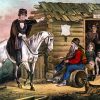calsfoundation@cals.org
Edsel Ford (1928–1970)
Although Edsel Ford did not arrive in the Arkansas Ozarks until the age of eleven, he lived most of his adult life in the region, consistently incorporated its culture into his writing, and became one of its most distinguished poets. At the time of his death, at the age of forty-one, he was a well-established regional poet who was beginning to earn national literary attention.
Edsel Ford was born to James Tilden Ford and Nora Louisa Ford in Eva, Alabama, on December 30, 1928. His family farmed cotton, and he was one of four children. When Ford was two years old, he moved with his family to Roswell, New Mexico. In 1939, the family moved to Avoca (Benton County) to operate a chicken farm.
Ford attended public school in Rogers (Benton County), and he served as editor of the school paper, The Mountaineer, before graduating in 1948. Ford enrolled as a journalism major at the University of Arkansas (UA) in Fayetteville (Washington County) in the fall of that same year. While in college, Ford won a Poets’ Roundtable of Arkansas award; founded and edited a literary magazine, Avalaff; co-wrote a book of poetry, Two Poets, with his friend Carl Selph in 1951; and published his own book of poetry, The Stallion’s Nest, the next year.
Immediately after graduating from college in 1952, Ford was drafted into the army. Due to poor eyesight, he was stationed in Hanau, Germany, rather than in Korea. Several poems he wrote during his military service appeared in Stars and Stripes; he re-published these as This Was My War in 1955.
After being discharged in November 1954, Ford was employed in the offices of Phillips Petroleum in New Mexico. In 1956, his manuscript, “The Manchild from Sunday Creek,” won the Kaleidograph Book Competition. This success prompted him to quit his job and devote himself to poetry, but he soon found earning a living as a poet to be difficult. Ford returned to his parents’ farm in February 1958 and began editing a poetry column, “The Golden Country,” for The Ozarks Mountaineer. In 1959, he published One Leg Short from Climbing Hills, a collection of light verse and tall tales.
Ford enjoyed several literary successes during the 1960s. He and his friend Hank Spruce formed Homestead Publishing in 1961 and published Ford’s A Thicket of Sky. In 1962, Ford’s poem “Return to Pea Ridge” was read at the dedication of the Pea Ridge battleground. In 1965, he published Love Is the House It Lives In and was paid $750 by Boy’s Life for “St. Nicholas Rides Again.” In 1965, Ford was invited by the Library of Congress to record some of his poems. A year later, the University of Arkansas inducted Ford as a Distinguished Alumni, and he received the Alice Fay di Castagnola Award ($3,500) from the Poetry Society of America. Perhaps the most significant of Ford’s achievements during this decade was that his manuscript “Looking for Shiloh” was awarded the Devins Memorial Award in the 1968 Kansas City Poetry contest and was published by the University of Missouri Press.
Ford was a hardworking, prolific poet, and his work appeared in more than 100 publications, yet he is generally viewed as a minor or regional poet. Such assessments are based on the immaturity of much of his early poetry and the old-fashioned, formal flavor of much of his later work.
Ford never married and had no children. He died on February 19, 1970, following exploratory surgery that revealed a large brain tumor. He is buried at Benton County Memorial Gardens in Rogers.
For additional information:
Anderson, Clay. “Bard of the Golden Country.” The Ozarks Mountaineer (October 1970): 16–17.
Edsel Ford Papers. Special Collections. University of Arkansas Libraries, Fayetteville, Arkansas.
Williams, Nancy, ed. Arkansas Biography: A Collection of Notable Lives. Fayetteville: University of Arkansas Press, 2000.
Woodward, Clyde Marcus. “Edsel Ford: Poet Immortal.” MA thesis, University of Arkansas, 1975.
Phillip Howerton
North Arkansas College
 Arts, Culture, and Entertainment
Arts, Culture, and Entertainment Literature and Authors
Literature and Authors World War II through the Faubus Era, 1941 through 1967
World War II through the Faubus Era, 1941 through 1967 Edsel Ford
Edsel Ford 




Comments
No comments on this entry yet.